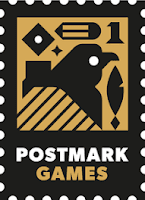Postmark Games
Designers Matthew Dunstan and Rory Muldoon founded new publisher Postmark Games in November 2021 with a Kickstarter campaign for Voyages, a roll-and-write game that would only be available as a print-at-home game.
All of Postmark Games' products, in general, will be designed to be printed at home, as Dunstan and Muldoon explain here. (If you missed the Kickstarter campaign, Voyages is available for purchase on the Postmark Games website.)
I'm not sure if I missed earlier releases in this vein or if Dunstan and Muldoon were just riding the crest of a wave, but I've now seen a slew of games — virtually all of them roll-and-write concepts — released in the same way. Many Kickstarter campaigns previously included a print-and-play version of a game as a reward, but now some are going all-in – print-and-play or bust.
For example, Meeplechase Games' Colleen Williams has her roll-and-write design Waterline on Kickstarter (KS link) with an incredibly low goal of $150. The rules of the game are as follows:
Quote: In Waterline, you and the other players are trying to connect openings in the player grid with a single pipeline, but you want to accomplish more than that to maximize your score.
Board Game: Waterline
The active player rolls the two six-sided dice once per round, and then each player uses the die results to create pipe segments in their grid as they see fit. For simple pipe, you can use the die numbers separately, or add their values to utilize one of the special connectors. If you roll doubles, you'll obtain a rock, which you'll need to place someplace in your grid.
If a 7 appears, you have the option of choosing between two basic pipes or one special pipe. Some places on your player sheet have already been filled in, so you can use them or ignore them as you see fit. You want to stay away from rocks.
The game finishes after a specific number of dice rolls, and if you have not completed your goal, you will receive 0 points and will lose. If you have, your score is determined by how well you used existing pipes, the number of rows and columns you filled with objects (including rocks and unused pipe), the number of starred spaces you included in your pipeline, the total number of pipes used, and whether you used more corner pieces than the other players.
Matt Parkinson of Empee Games is another first-timer, with his roll-and-write game Wine Management (KS link), which was motivated by his passion for viticulture.
Wine Management is a board game.
Here's a quick rundown of the game:
Players in Wine Management compete to run vineyards. Each round, players choose an action and a multiplier based on the values of two out of three thrown dice. The actions are as follows:
—Plant vines
—Harvest vines for grapes
—Process grapes to make wines
—Fulfillment of wine orders
—Hire employees to earn one-time bonuses
—To increase your popularity, give tours of your vineyard.
To maximize their points, players must balance all available actions.
• Other well-known game designers have followed suit, with Steve Finn of Dr. Finn's Games adapting his 2021 tile-laying game Mining Colony to a print-and-play format under the name Mining Colony Duel, which was Kickstarted at the start of 2022. Here's a rundown of the gameplay:
Mining Colony Duel is a 1-2 person "BYOP" (bring your own pencil) variation of Mining Colony, a print-and-play game that only requires printed sheets and pencils.
In the game, you are tasked with establishing a mining colony on a distant planet. Players bid for resources such as polyomino tiles, domes, landing pads, and science stations at the start of each round. Players arrange (draw) the resources onto their sheets after revealing their bids, attempting to achieve various goals such as having numerous objects of the same sort in a row or column.
Board Game: Mining Colony Duel




No comments